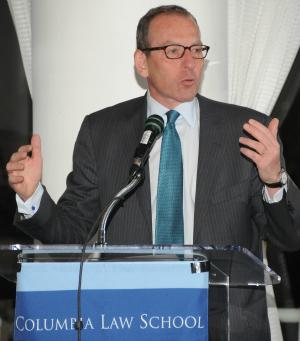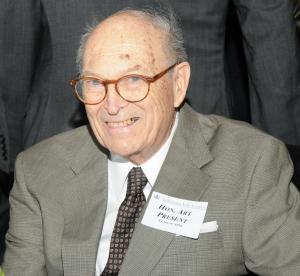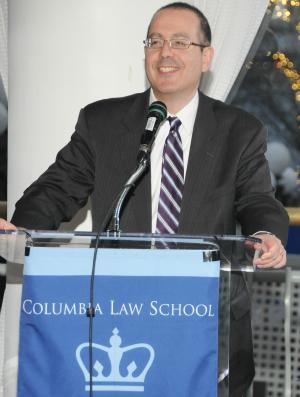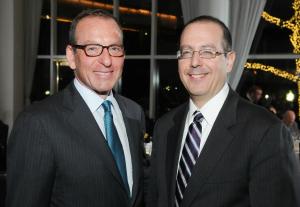Generations of Alumni Gather for 17th Annual D.C. Dinner Featuring Former Top Federal Prosecutor
Lanny A. Breuer '85, Former Assistant Attorney General, Reflects on a Career in Public Service and Private Practice
Washington, D.C., April 22, 2013—Much to the chagrin of his mother—a Holocaust survivor who wanted the best for her son—former Assistant Attorney General Lanny A. Breuer ’85 passed on the chance to work for a law firm immediately after he graduated from Columbia Law School.
Instead, he took a position as an assistant district attorney in Manhattan. When he told his mother of his decision, he mentioned some of the prominent people in the office: Cyrus R. Vance Jr., now the district attorney; Dan Rather Jr., son of the famous journalist; and Andrew M. Cuomo, now governor and son of former Gov. Mario Cuomo.
| Assistant Attorney General Lanny A. Breuer '85 |
“There was a long pause, and my mother said, ‘Them? They should go to the DA’s office. You? You should go to a firm,’” Breuer recalled in a speech at the Columbia Law School Association of Washington, D.C.’s 17th annual dinner on April 4, prompting laughter throughout the crowd of alumni and students in attendance.
Breuer’s decision paid off in the end—and presumably pleased his mother. The four years he spent prosecuting violent crime were the start of a career in which he would move seamlessly between private practice and public service, an experience he said has made him a better attorney. Breuer last month left his position as President Obama’s top federal prosecutor, returning to Covington & Burling as vice-chair of the firm.
| Judge Arthur S. Present '50 |
In his talk, “Reflections on a Career in Public Service and Private Practice,” Breuer spoke about the importance of government service and the influences that have shaped him and his career. It was a message that resonated strongly with the generations of Columbia Law School graduates and students in attendance, including Judge Arthur S. Present ’50 and Robert M. Bernstein ’13.
Although more than 60 years separate the men, both embody the ideals Breuer described in his speech. After Present graduated in 1950, he went to work as a clerk for a tax court judge and later took the bench himself as an administrative law judge for the Civil Aeronautics Board and the Interstate Commerce Commission. Like Present, Bernstein, who has been working this semester at the Department of Justice through the Law School's Externship on the Federal Government in Washington, D.C., plans to continue his public service when he graduates in May. He has accepted a clerkship with a judge on the U.S. Court of Appeals for the 6th Circuit.
| Dean David M. Schizer |
"It's always inspiring to come to our nation's capital and see so many friends here," said Dean David M. Schizer, the Lucy G. Moses Professor of Law and Harvey R. Miller Professor of Law and Economics, who welcomed the guests and introduced Breuer. “Every morning when I look at the newspaper and look at the stories on the front page, it strikes me that virtually all of them have some connection to the work being done by the people in this room and the people at the Law School.”
This year's dinner was the first to include students in the D.C externship program, which began in the fall of 2010.
As Breuer described in his speech, he eventually did join a law firm, making a name for himself as a defense attorney and serving as co-chair of Covington & Burling’s white-collar defense and investigations practice and vice-chair of its pro bono committee. But he returned again and again to government, later becoming special counsel to President Bill Clinton, and, in what he described as his "greatest privilege," the Department of Justice's criminal division chief under Obama.
Appointed in 2009, Breuer was one of the longest serving criminal division chiefs in the Department's history.
"Had I not gone to Columbia Law School, I actually don't think I would have had the great opportunities that I feel I've been lucky enough to have," Breuer said in his talk.
He offered this advice: be open to opportunities however they present themselves. Because of another attorney's conflict, Breuer had the chance early in his career to represent a gay Marine in a challenge to the military's ban on gay servicemembers. The case put him on the radar of people who ultimately recommended him for the job of special counsel to President Clinton, whom he defended during the impeachment proceedings and other investigations.
"That was of course an extraordinary experience for me that really occurred because I was willing to take on a pro bono case," he said. “It’s as simple as that.”
Breuer talked about his work as head of the criminal division, where he helped set priorities and policies for the nearly 600 lawyers who serve as U.S. federal prosecutors. The division’s investigation into banks’ manipulation of the London Interbank Offered Rate has so far led to $2 billion in criminal penalties, guilty pleas by UBS and RBS subsidiaries, and charges against several individuals. A money-laundering unit spearheaded by Breuer has brought in approximately $3 billion in criminal forfeitures, including more than $1 billion from HSBC Holdings, the largest penalty ever imposed under the Bank Secrecy Act.
| Lanny Breuer and David Schizer |
Breuer also oversaw the Justice Department’s Deepwater Horizon Task Force in the wake of the April 2010 offshore explosion and subsequent oil spill. Earlier this year, BP, which pleaded guilty to 11 felony manslaughter charges, environmental crimes, and obstruction, was ordered to pay $4 billion in criminal fines and penalties—the largest criminal resolution in U.S. history.
The criminal division pursued a range of other federal law enforcement priorities under Breuer, including reducing the sentencing disparities for crack and powder cocaine, and ramping up investigations into health care fraud, bribery, cybercrime, intellectual property theft, and public corruption.
After his talk, the Columbia College graduate and Harlan Fiske Stone Scholar, took questions from guests on his prosecution of financial crimes and the “revolving door” between government and private practice.
Breuer said experience on both sides of criminal and civil cases has made him a better attorney, and he credited the Law School with launching him onto the path of success.
John S. Reardon '93, president of the Columbia Law School Association of Washington, D.C., said the evening was "a great event for the D.C. community" and that it was important to have public servants like Breuer speak.
"It just shows that there are other paths for graduates," he said.
But that surely came as no surprise to the generations of Columbia Law School family in attendance—public servants future, past, and Arthur Present.



